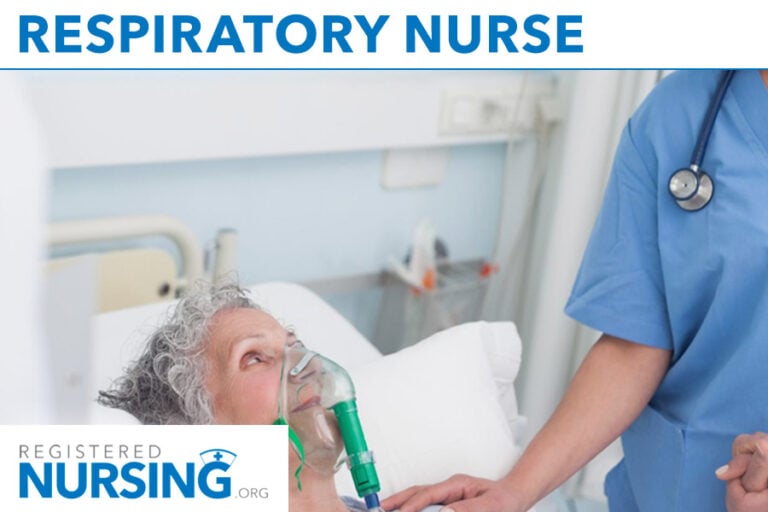Respiratory Nurse

What is a Respiratory Nurse?
A respiratory nurse, also called a pulmonary care nurse, is a nursing professional who plays an instrumental role in treating patients suffering from respiratory ailments. As problems in the respiratory system can result in several complications, some of which can be fatal, proper treatment is essential. A respiratory nurse will often care for patients suffering from both acute and chronic respiratory illnesses. Such illnesses include asthma, pneumonia, bronchitis, emphysema, tuberculosis, and lung cancer.
How Do I Become a Respiratory Nurse?
Respiratory nurses enjoy the rewards of implementing treatment plans for patients with respiratory issues and monitoring the regimen to determine its efficacy. Therefore, nurses who enjoy forming lasting relationships with patients will do well in the role. Respiratory nurses must have a strong knowledge of the respiratory system, including the trachea, lungs, and bronchi, and be familiar with the related illnesses and mechanical devices used to treat them. A background in critical care nursing can be especially helpful.
What Are the Schooling Requirements for Respiratory Nurses?
The first step towards becoming a respiratory nurse is first becoming a registered nurse. To become a registered nurse, one must first obtain a nursing degree. An Associate's Degree in Nursing (ADN) will take two years to complete, whereas a Bachelor's of Science in Nursing (BSN) will take four years. The ADN or BSN is required for this role.
Upon completing an Associate's or Bachelor's nursing program, one must pass the National Council Licensure Examination for Registered Nurses (NCLEX-RN) to get their RN license and begin working as a respiratory nurse.
While not always necessary, earning a postgraduate Master of Science in Nursing (MSN) degree from an accredited nursing school will take an additional two years. With a master's degree, the respiratory nurse will then specialize in pulmonary or respiratory health. Some nursing schools offer more specific master’s specialties, such as pediatric pulmonology or geriatric respiratory health.
Are Any Certifications or Credentials Needed?
While there is no certification specific to the respiratory nurse, many of them earn critical care certifications offered by the American Association of Critical Care Nurses. This organization offers specific certifications for adult, pediatric, and neonatal acute/critical care, which can be very helpful to the respiratory nurse. The National Board for Respiratory Care also offers a credential in Certified Pulmonary Function Technology (CPFT), among others. Here is an overview of the certifications you may be interested in if you want to enter this profession:
| Certification | Length to Complete | Key Differences |
| Certified Asthma Educator (AE-C) | Varies (usually several months) | Focuses on asthma management and education, enhancing the nurse’s ability to educate patients on asthma care. |
| Certified Respiratory Therapist (CRT) | Varies (typically 2-4 years) | Entry-level certification for respiratory care, covering a broad range of respiratory therapies. |
| Registered Respiratory Therapist (RRT) | Varies (typically 4-6 years) | Advanced certification, requiring additional exams, offering higher recognition and job opportunities. |
| Certified Pulmonary Function Technologist (CPFT) | Varies (few months to 1 year) | Specializes in pulmonary function testing, focusing on diagnosing and managing lung conditions. |
| Certified Critical Care Registered Nurse (CCRN) | Varies (typically 1-3 years) | Focuses on critical care, including respiratory care in ICU settings; broader than respiratory-specific certs. |
| Neonatal/Pediatric Respiratory Care Specialist (NPS) | Varies (few months to 1 year) | Specializes in respiratory care for neonatal and pediatric patients, covering unique aspects of this population. |
What Does a Respiratory Nurse Do?
A respiratory nurse works with patients who need care for acute or chronic respiratory illnesses. This population of patients can range from pediatrics to geriatrics so it is imperative that respiratory nurses feel comfortable and confident in delivering care to all age groups. In addition to planning and implementing treatment plans, another key role as a respiratory nurse is educating patients on the prevention and progression of such illnesses, including encouraging patients to modify their lifestyles and habits.
Where Do Respiratory Nurses Work?
Respiratory nurses typically work within hospital settings to assist patients who are undergoing treatment for respiratory problems. Other facilities include:
- Clinics
- Private offices
- Military or government facilities
- Assisted living facilities
- Home care agencies
- Long-term care facilities
What Are the Roles and Duties of a Respiratory Nurse?
A respiratory nurse’s primary goal is to plan and implement treatments for patients with a respiratory illness and prevent these respiratory problems from developing or worsening. Other duties include:
- Assist with respiratory care
- Interview patients on symptoms and previous diagnoses
- Manage patients with respiratory issues
- Perform diagnostic testing
- Perform emergency procedures on patients who have suffered from heart attacks, shock, or from drowning
- Manage medications, airways, and breathing treatments
- Administer oxygen therapy
- Expert ability to educate patients and families on maintaining respiratory health, such as smoking cessation and utilizing a regular exercise regimen
- Collaborate with other healthcare professionals, including therapists and physicians
Respiratory Nurse Salary & Employment
The employment outlook for respiratory nurses is on a continuous rise, and prospective nurses can expect a competitive salary and room for advancement. Experience level and location play crucial roles in salary, and on average, respiratory nurses earn $86,070 per year.
| Average Annual Salary | |
| Lowest Earners | $63,720 |
| Lowest 25% of Earners | $75,990 |
| Median | $86,070 |
| Top 25% or Earners | $104,670 |
| Top Earners | $132,680 |
Helpful Organizations, Societies & Agencies
- The Journal for Respiratory Care
- Perspectives in Respiratory Nursing
- Respiratory Nursing Society
- Respiratory Health Association








